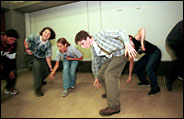On campus
It is to laugh
 A McGill Improv workshop in session
A McGill Improv workshop in sessionPHOTO: Owen Egan |
|
My house is on fire, I have no shirt, I have a weird skin disease and I somehow have to get gas for my scooter, and 10 people are looking at me to see what I say next.
"So what you're saying... is I have to call the fire department for a ride?"
Whew... It was lame, but I'm off the spot until the next round.
Welcome to McGill Improv's weekly comedy workshop, where every Saturday afternoon you can jump around like a monkey, pretend to be Superman, and talk to an imaginary magic spoon. You'll laugh a lot too.
"We've been around since 1987. We hold workshops that review everything from the basics of improv to performing troupes," says McGill Improv "Head Cheese" Miri Freidowitz, a science student.
Improvisational comedy sounds like a lot of people's nightmares -- thrust onstage in front of an expectant audience, with no idea what you're supposed to say. Plus, you have the additional pressure to be funny.
However, at only their second workshop of the year, more than 20 students came out to McGill Improv's workshop to make rude noises, sing goofy songs, and otherwise make a spectacle of themselves.
"People come for a lot of different reasons... A lot of people come because they're shy, and this is a way to be more outgoing," says Freidowitz.
So how do you train someone to be funny? Workshop leader Bryan Walsh, an electrical and computer engineering graduate from 1999, put his charges through a variety of exercises designed to help people relax in front of a crowd and to follow each others' cues.
Exercises include word-association games, making up tales based on audience suggestions, and a game where a story is passed around a circle, with every person adding a new element. It's harder than it sounds -- this reporter got a serious case of "brain-freeze" when faced with the house fire, missing shirt and skin disease.
"This kind of comedy is inherently funny, you don't have to be a funny person to do it. All you need are the good habits of improv," says Walsh, explaining that an improv performer has to be ready to let go of his own ideas. "You have to be able to share ideas with other people."
In addition to spawning a number of newer campus troupes, such as Without Annette, McGill Improv also has a number of famous alumni. These include Scott Falconbridge, who has performed at the Just for Laughs festival and on CBC's Comics, Terence Bowman, who is a member of The Vestibules, frequently heard on CBC Radio, and local broadcast personality John Moore. Local Improv groups such as On The Spot are also largely made up of former McGill Improv members.
Aspiring comics need not be intimidated -- the group welcomes new members. In order to perform with the troupe all one needs to do is show up to two workshops. The troupe performs a number of shows throughout the year, including an annual show called Raganza, a 24-hour improv marathon. Last year the troupe proudly claims to have had an audience for all but an hour and a half of the marathon.
New member Alice Volkmar, an arts student, was attending her first workshop with McGill Improv, and she hopes to be on stage with them soon.
"I saw them once and I thought if I can learn to be funny like that then why not," says Volkmar.
"Basically, I was just looking for a good time."
Mark Reynolds
Mozart, you're overrated
 |
|
Attention parents: Listening to Mozart won't turn your toddler into a genius. The much-ballyhooed "Mozart Effect" has been vastly overhyped, according to Harvard education researcher and developmental psychologist Lois Hetland.
Hetland was part of the Harvard team that put together the largest, most comprehensive study ever conducted on the effects of arts on education. "Arts advocates need to stop making sweeping claims about the arts as a magic pill for turning students around academically," Hetland told the Harvard Gazette.
Hetland will be discussing her work on September 28 at 4 pm in the Jack Cram Auditorium of the Education Building when she presents a seminar titled, "The Arts and Academic Achievement: What the Research Shows."
Hetland and her colleagues say that the results from the original research that seemed to back the notion that listening to Mozart could raise IQ levels were difficult to quantify and have been exaggerated by marketing pros "motivated not by education but by a desire to sell CDs. I feel sorry for parents who are duped by the hype."
Which isn't to say that arts education isn't valuable. Learning music does seem to lead to an improvement in spatial reasoning although experts still aren't quite certain why that is. Drama classes help improve reading, writing and verbal skills and the connection there isn't difficult to imagine.
But Hetland doesn't think that parents should enrol kids in music courses with an eye toward producing better arithmetic marks. "Arts should be justified in terms of their intrinsic merit; they offer a way of thinking unavailable in other subjects. Arts teachers should not be held responsible for better test scores in math or history."
Be a sun soaked scholar
 |
|
How many McGill research outposts do you know of that come equipped with scuba gear so you can go and see the coral reef up close?
McGill's Bellairs Research Institute in Barbados is one of the University's lesser-known treasures. "It's one of the things that makes us unique," says Dean of Science Alan Shaver. "No one else in Canada has this kind of base in the tropics."
The institute represents, possibly, the most unique gift ever made to McGill. Commander Carlyon W. Bellairs left the institute to McGill in 1954 to spark scholarship on the tropics
Animal science professor Bruce Downey is the new director for Bellairs. His chief priority is to remind the McGill community that the institute exists and that it provides unique quarters for work and play.
While scientists from institutions from around the world make use of Bellairs, Downey says that newer McGill faculty often haven't heard of the place.
Shaver also wants to give Bellairs more prominence along with McGill's other unique field stations such as the Gault Nature Reserve in Mont St. Hilaire and the McGill Sub-Arctic Research Station in Schefferville, Quebec. "I would like to see these field stations play a more important role in our academic misson," says Shaver, stressing that he doesn't think the stations need be used for research alone. Pointing to the popularity of McGill's field study semester in Panama and the glowing reports received from students who've studied there, Shaver wants to encourage professors to use the stations for teaching as well. "These are laboratories of the environment. It offers us an opportunity to offer our students an absolutely unique experience."
Agricultural and biosystems engineering professor Robert Bonnell taught a course to McGill students at Bellairs in April and is currently putting together a 15-credit package that students can take by spending a semester in Barbados.
The breach-front institute occupies two acres of land and even if you don't want to study the island's flourishing tourism industry or its wildlife or its water resources, Barbados is still an awfully pleasant place to be.
"The climate is outstanding, much better than Florida," says Downey. Thirty to 35 guests can stay at Bellairs at any time. "Accommodations are modest by hotel standards but pleasant," says Downey. And the price is right. Depending on the season, "you can get a one bedroom apartment here for $500 a week. Some of the hotels charge you that much for a single night."
Hate cancer? Walk the talk
 MOSAIC organizers
MOSAIC organizersPHOTO: Jean-François Majeau |
|
They haven't treated any patients yet but the medical class of 2005 is already up to some good.
The students are organizing the inaugural MOSAIC walkathon, which will take place on October 6.
An 11-km walk will begin at the Roddick Gates and wind its way through the downtown core and Old Montreal to raise money for cancer research at the McGill Cancer Centre, and promote awareness of the need to support this cause.
Organizer Mandeep Dhillon got the ball rolling last year as a pre-med student. One member of the group has a sister with cancer, which fuelled the inspiration for the walk, and many others have family members with the disease.
Organizers expect a robust turnout of 350-400, with students from the medical school at Université de Montréal, John Abbott and Marianopolis CEGEPs, and McGill all taking part.
The event will feature live bands, speakers and a raffle. A free T-shirt and supper goes to those who raise more than $20. On-site registration is from 10 am to 11 am at the corner of Sherbrooke and McGill College. If you want to take part, make a pledge or you just want to find out more, go to www.geocities.com/mosaicwalk

